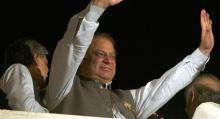
Nawaz Sharif, leader of the Pakistan Muslim League-Nawaz party, is poised to become Pakistanâ??s prime minister for a third time. (AP Photo)
(CNSNews.com) – President Barack Obama and Secretary of State John Kerry congratulated Pakistan on a weekend election that marks its first-ever transition between two democratically-elected civilian governments, but the outcome promises to bring new challenges to an already troubled relationship.
The man now poised to lead the world’s second largest Muslim country, Nawaz Sharif, has said Pakistan should reconsider its cooperation in the U.S.-led war against Islamic extremists and has criticized the use of drone strikes as part of that campaign.
He also has expressed a desire to hold reconciliation talks with Tehrik-e-Taliban Pakistan (TTP), a group of militants allied to al-Qaeda and the Afghan Taliban. The TTP, also known simply as the “Pakistani Taliban,” carried out violent attacks during the election campaign that left more than 150 people dead.
Previous attempts by Pakistani leaders to make peace with the TTP and its precursor groups in the tribal areas adjacent to the border with Afghanistan have invariably had an adverse impact on the NATO-led mission in the neighboring country, according to U.S. military officials. Washington has designated the TPP a foreign terrorist organization, calling it a “force multiplier” for al-Qaeda.
During a drawn-out dispute between Pakistan and the U.S. triggered by the accidental Nov. 2011 killing in a U.S. airstrike of 24 Pakistani soldiers, Islamabad for months shut off crucial NATO supply lines to Afghanistan and demanded an end to the use of U.S. drone-fired missiles against militants in the border areas.
Sharif and another opposition politician, Imran Khan, supported the government’s stance, and were angered when it relented last July and agreed to reopen the supply lines without securing a U.S. pledge to end the drone strikes.
With Sharif now set to become prime minister, the drone issue, which has long been an irritant, has the potential to spark a new full-blown crisis in a bilateral relationship that has seen plenty of such crises.
Pakistan has received more than $20 billion in U.S. aid military and non-military aid since 2001, much of it tied to security cooperation. The administration’s fiscal year 2014 request for Pakistan totals $1.4 billion.
Kerry, who in his previous capacity as chairman of the Senate Foreign Relations Committee led a congressional drive for generous financial assistance for Islamabad, said in a brief statement Sunday the U.S. will “be working with the new government to advance shared interests including a peaceful, more prosperous and stable future for Pakistan and the region.”
Obama called Saturday’s election a significant milestone in Pakistan’s democratic progress” and said his administration was ready to work with Pakistan’s new government “as equal partners.”
Both Obama and Kerry congratulated Pakistanis for standing up to threats and intimidation by “violent extremists” – the same extremists Sharif says he wants to hold talks with.
As of early Monday, Sharif’s Pakistan Muslim League-Nawaz (PML-N) party looked likely to be able to govern alone with the support of a few independent candidates, having reportedly secured as many as 125 of the 272 directly-elected seats in the National Assembly.
Imran Khan’s Movement for Justice (PTI) was in second place, with around 33 seats – an impressive tally for a party that boycotted the last election – while the outgoing governing party, President Asif Ali Zardari’s Pakistan People’s Party (PPP), was languishing in third place with around 30 seats.
Sharif’s showing was a remarkable comeback for a man who has been Pakistan’s prime minister twice before: He served from 1990-1993 before he was pressured to resign by the military amid a constitutional crisis; and from 1997-1999, before being toppled in a military coup led by army chief Gen. Pervez Musharraf.
Convicted of ordering the hijacking of an aircraft carrying Musharraf, Sharif secured a plea bargain deal that required him to leave the country. He lived in Saudi Arabia until 2007 when he returned home to contest parliamentary elections in 2008.
The PML-N came second in that election, briefly joined its longstanding rival, PPP, in a coalition government but later withdrew over policy differences with Zardari.
Sharif on Sunday called on all political parties to “come to the table and sit with me and solve the country’s problems.”
Source material can be found at this site.









